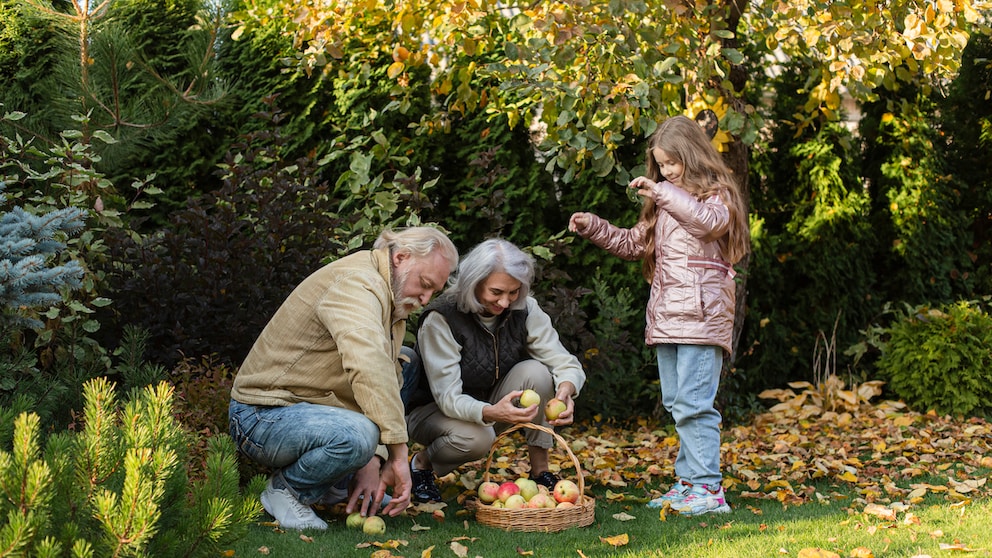October 10, 2024, 11:07 am | Read time: 5 minutes
Fruit from your own garden is usually particularly tasty. Not only because it has been allowed to grow free from pesticides but also because you can taste the work and passion behind it. But what should you do when you’ve had too much, and the fruit falls from the tree? myHOMEBOOK explains how you can still use fallen fruit or dispose of it properly.
Pears, plums, and apples often ripen in the garden at the same time. Sometimes, it just gets too much, and you can no longer keep up with the harvest. The result is that the overripe fruit falls from the tree. Can this fallen fruit be left lying in the garden, or can it even be utilized in some way?
Overview
Fallen fruit should not be left lying around but collected instead
If fallen fruit is not picked up, it is in danger of rotting. The robust natural gardener is happy about this, as the rotting fruit is an organic fertilizer and a source of food for birds, small animals, and insects. However, these also include wasps, which then circle under the tree from which you may still want to harvest.
Conversely, the meticulous hobby gardener fears that the decaying fruit will damage the lawn or that less welcome animals will also get a taste for it. Very few people want to see voles, field mice, rats, and wild boars in their gardens.
In addition, moldy, rotten, or pest-infested fruit can easily spread diseases, explains Ursula Bauer, a biologist at Aktion Tier.
Especially fallen fruit infested with pests should not be left to rot in the garden. To prevent diseases, fungi, or pests from spreading, such fruit should be collected regularly, preferably daily! If worm-infested fallen fruit is left lying around, there is a risk of renewed infestation with apple or plum moths next spring.
How do I collect the fallen fruit?
Either by hand – but this is tedious and will wear you out over time. A rake is helpful here, with which you can pull the fallen fruit together and transport it away in a bucket or wheelbarrow.
But you can also make the work easier. If you only want to collect small quantities or individually scattered fruit, it is worth buying a so-called apple or roll collector. This useful garden tool, a kind of round wire basket on a handle that you roll over the lawn, collects the fallen fruit without damaging the fruit.
The advantage: You empty the basket when it is full and don’t have to bend down all the time.
For a larger garden or an orchard, investing in a fruit picker with spikes, often referred to as a ‘fruit hedgehog,’ is beneficial. This garden tool can also be rolled across the lawn. In contrast to the roller collector, the fruit hedgehog spears the fruit, which then falls into a collection container. However, the fruit cannot be stored because of the spike holes.
How do I dispose of healthy fallen fruit?
In the kitchen, for example! Preserving, canning, pressing or baking – healthy fruit can be used to make delicious jams, cakes and juices. For processing larger quantities into juice, you can reach out to a cider mill.
Tip: The Nature and Biodiversity Conservation Union (Nabu) lists over 300 stationary and mobile cideries in Germany where you can make an appointment. For lovers of spirits, Nabu also offers a list of distilleries that make high-proof spirits from your fruit.
Compost or bury small quantities
Small quantities of fallen fruit can be put in the compost; larger quantities can simply be buried in the garden. If you want to do something good for the garden inhabitants, you can leave some fruit lying around. It is also possible to offer the fallen fruit as animal feed. If you live in a rural area, you can give your healthy fallen fruit to a farm as animal feed. Many hunters also accept surplus fallen fruit for feeding wildlife. Animal parks and petting zoos are also happy to receive food donations. But not rotten windfalls – they give the animals colic and diarrhea.
How do I dispose of diseased windfall fruit?
Fallen fruit infested with worms can be disposed of in the brown organic waste bin. But in moderation! Excessive quantities of fruit make the garbage can very difficult for the waste collection service to remove. In addition, wasps and flies are attracted, and there is a risk of maggot infestation!
Some waste disposal companies require fallen fruit to be disposed of in organic waste bags. If in doubt, ask your local authority. You can also take fallen fruit to a collection site operated by the local waste management service.
Do not compost diseased fallen fruit
Fruit infested with fungi and pests should not be added to the compost, as it would provide a breeding ground for the pathogens. And when the compost is spread next year, new plants would be infested.
Please note: fallen fruit is garden waste – and you must not dispose of it in the forest! Otherwise, you could face a substantial fine of up to 2500 euros.

Soft fruit Planting and caring for blackcurrants in the garden

Gardening in Late Winter 6 Steps to Prepare your Garden for Spring

Voracious Pests What Really Helps Against Larder Beetles in the Home
Can you leave dried fruit hanging on the tree?
Even fruit that appears to have dried out on the tree should not simply be left hanging there. “These so-called fruit mummies are caused by a mold that can infect the new fruit next spring,” says Ursula Bauer. It is best to throw these pieces directly into the organic waste garbage can to protect the fruit trees.
With material from dpa

